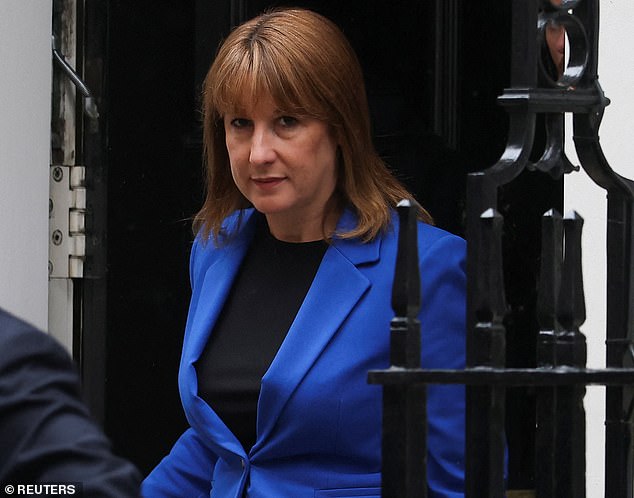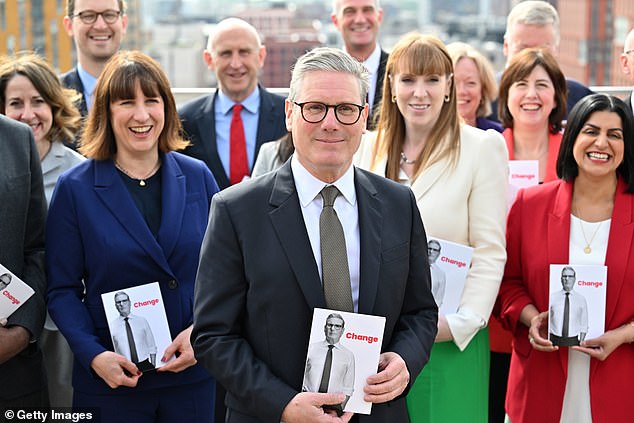Rachel Reeves was set to be the only survivor among the Govermment’s top jobs today as Sir Keir Starmer conducted a brutal purge of his Cabinet ministers.
After being forced into action by Angela Rayner‘s resignation as Deputy Prime Minister over her tax row, Sir Keir carried out a frantic reshuffle of his administration.
The Prime Minister’s overhaul was shaping up to be more wide-ranging than many had expected, as he took the axe to Britain’s great offices of state.
Yvette Cooper is expected to be moved from Home Secretary to Foreign Secretary, while David Lammy is being demoted from the Foreign Office to Justice Secretary.
Shabana Mahmood looks set leave the Ministry of Justice to take over at the Home Office, where she will be left to grapple with the small boats crisis.
And Liz Kendall is thought to be going as Work and Pensions Secretary following massive rows over winter fuel payments and botched welfare cuts.
But Ms Reeves – even though she was the architect of the now-abandoned winter fuel payment cuts and welfare debacle – is expected to remain in her role.
This is despite the Chancellor also being under pressure over Britain’s sluggish economy, which is blamed, in part, on her tax-hiking Budget last year.
Meanwhile, Ms Reeves is facing the prospect of a debt crisis after the yield on 30-year Government bonds, called gilts, rose to a 27-year high earlier this week.

Rachel Reeves was set to be the only survivor among the Govermment’s top jobs today as Sir Keir Starmer conducted a brutal purge of his Cabinet ministers.

Sir Keir has repeatedly expressed his full confidence in his Chancellor and will be unlikely to want to risk market turmoil by ditching her after little more than a year

After being forced into action by Angela Rayner ‘s resignation as Deputy Prime Minister over her tax row, Sir Keir carried out a frantic reshuffle of his administration
Sir Keir has repeatedly expressed his full confidence in his Chancellor and will be unlikely to want to risk market turmoil by ditching her after little more than a year in charge at the Treasury.
In July, the sight of Ms Reeves weeping in the House of Commons – as she sat next to Sir Keir in the wake of Labour’s welfare U-turn – was accompanied by a surge in borrowing costs and a slump in the pound.
Markets reacted after the Chancellor’s emotional state sparked speculation about her position in Government.
Bringing in a new Chancellor at this point would also leave a possible replacement for Ms Reeves with under three months to prepare for a crucial Budget, scheduled for November 26, amid claims of a £50billion ‘black hole’ in the public finances.
Downing Street this week insisted Sir Keir had not dealt a blow to Ms Reeves with his shake-up of No10 aides.
On Monday, Sir Keir moved the Chancellor’s deputy, Darren Jones, into a new role as chief secretary to the PM.
He also brought in Baroness Minouche Shafik, a former Bank of England deputy governor, as his chief economic adviser.
And Sir Keir appointed senior Treasury mandarin Dan York-Smith as his principal private secretary.
The reshuffle was seen as a sign the PM is seeking to bolster No10’s economic firepower before the tricky Budget this autumn, with speculation rife over tax rises.
But No10 denied it had diminished Ms Reeves’ role, with Sir Keir and the Chancellor said to have spoken ‘at length over the summer about how these changes would bolster their joint approach to the growth agenda’.
Worries are mounting over the UK’s finances before the Budget, with concerns that the Chancellor will be forced to hike taxes and slash spending to balance the books.
The yield on UK government bonds – also known as gilts – this week jumped to the highest level since 1998, at 5.698 per cent, meaning it costs more for the Government to borrow from financial markets.
When she entered the Treasury, Ms Reeves set out two key fiscal rules: the first to ensure that day-to-day spending is matched by tax revenues by 2029-30 rather than borrowing, and the second to reduce net financial debt as a share of the economy.
Analysts have suggested the spike in gilts was a sign that investors do not have confidence the Treasury will stick to its borrowing rules.
On Wednesday, Ms Reeves attempted to play down claims she is facing a £50billion ‘black hole’ in the public finances ahead of her second Budget.
The Chancellor also sought to dampen speculation she is poised to announce a fresh package of tax rises on British businesses and households.
There has been a flurry of speculation in recent weeks that Ms Reeves will unveil new property taxes at her next fiscal statement.
This includes the possible removal of capital gains tax exemption for the sale of some homes, a new levy on landlords, and replacing stamp duty with an annual charge.
Treasury officials are also said to be eyeing an inheritance tax raid, while economists have also predicted there could be further ‘stealth’ and ‘sin’ taxes.
In an interview with the BBC, Ms Reeves hit out at those ‘who seem to know what is in the Budget before we have made those decisions’.
‘A lot of them are talking rubbish, and frankly, a lot of what they’re saying is irresponsible,’ she added.
The Chancellor had earlier vowed to keep a lid on Government spending amid fears of a financial crisis, while she denied the UK economy was ‘broken’ under Labour.











